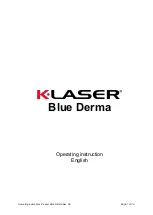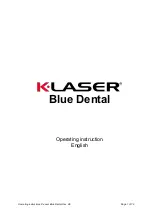
18000 and CTP-NB Series Service and Installation Manual
RECEIVING AND INSPECTING THE EQUIPMENT
Even though most equipment is shipped crated, care should
be taken during unloading so the equipment is not damaged
while being moved into the building.
1. Visually inspect the exterior of the package and skid or
container. Any damage should be noted and reported
to the delivering carrier immediately.
2. If damaged, open and inspect the contents with the
carrier.
3. In the event that the exterior is not damaged, yet upon
opening, there is concealed damage to the equipment
notify the carrier. Notification should be made verbally
as well as in written form.
4. Request an inspection by the shipping company of the
damaged equipment. This should be done within 10
days from receipt of the equipment.
5. Check the lower portion of the unit to be sure legs or
casters are not bent.
6. Also open the compressor compartment housing and
visually inspect the refrigeration package. Be sure lines
are secure and base is still intact.
7. Freight carriers can supply the necessary damage forms
upon request.
8. Retain all crating material until an inspection has been
made or waived.
Uncrating the Equipment
First cut and remove the banding from around the crate.
Remove the front of the crate material, use of some tools will
be required. If the unit is on legs remove the top of the crate
and lift the unit off the skid. If the unit is on casters it can be
"rolled" off the skid.
INSTALLATION
Location
Be sure the location chosen has a floor strong enough to support
the total weight of the cabinet and contents. A fully loaded 72" long
model may weigh as much as 2000 pounds. Reinforce the floor as
necessary to provide for maximum loading. For the most efficient
refrigeration, be sure to provide good air circulation inside and out.
Inside cabinet:
Do not pack refrigerator so full that air cannot
circulate.
Outside cabinet:
Be sure that the unit has access to ample air.
Avoid hot corners and locations near stoves and ovens.
It is recommended that the unit be installed no closer than 1 inch
from any wall.
Leveling
A level cabinet looks better and will perform better because the
drain pan will drain properly, the doors will line up with the frames
properly, and the cabinet will not be subject to undue strain. Some
models have casters for your convenience, for ease of cleaning
underneath and for mobility. It is important that the unit be
installed in a stable condition with the front casters locked before
operating.
































